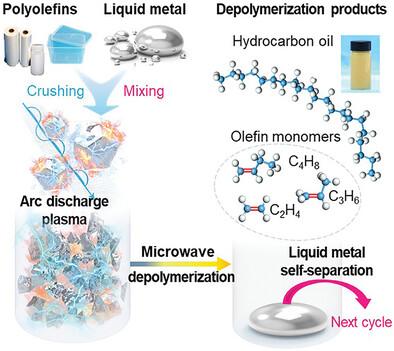当前位置:
X-MOL 学术
›
Adv. Mater.
›
论文详情
Our official English website, www.x-mol.net, welcomes your
feedback! (Note: you will need to create a separate account there.)
Microwave‐Powered Liquid Metal Degradation of Polyolefins
Advanced Materials ( IF 27.4 ) Pub Date : 2024-12-19 , DOI: 10.1002/adma.202412539 Jianye Gao, Jun Zhao, Zerong Xing, Minghui Guo, Haijiao Xie, Wangjing Ma, Jing Liu
Advanced Materials ( IF 27.4 ) Pub Date : 2024-12-19 , DOI: 10.1002/adma.202412539 Jianye Gao, Jun Zhao, Zerong Xing, Minghui Guo, Haijiao Xie, Wangjing Ma, Jing Liu

|
Upcycling waste plastics is highly promising to tackle global white pollution while achieving sustainable development. However, prevailing approaches often encounter challenges in scalable engineering practices due to either insufficient plastic upcycling capability or arduousness in the separation, recovery, and purification of catalysts, which inevitably augments the cost of plastic upcycling. Here, the microwave‐powered liquid metal synergetic depolymerization is presented to facilitate low‐cost plastic upcycling. By leveraging the fluidity of liquid metals and their exceptional chemical‐bond activation ability under microwave field, this method efficiently converts various polyolefins into narrowband hydrocarbon oil (Oil yield: 81 wt.% for polypropylene (PP), 85.9 wt.% for polyethylene (PE)) and high‐value olefin monomers (C2‐4 selectivity: 50% for PE, 65.3% for PP) over 30 successive cycles, resulting in a high turnover frequency of 2.83 kgPlastic mLLiquid metal −1 . These captivating advantages offered by electromagnetically‐powered liquid metals are also supported by their self‐separation features, thereby paving the way for large‐scale engineering solutions in waste plastic upcycling.
中文翻译:

聚烯烃的微波驱动液态金属降解
升级再造废塑料在解决全球白色污染的同时实现可持续发展是非常有希望的。然而,由于塑料升级再造能力不足或催化剂分离、回收和净化的难度,主流方法在可扩展的工程实践中经常遇到挑战,这不可避免地增加了塑料升级再造的成本。在这里,提出了微波驱动的液态金属协同解聚,以促进低成本的塑料升级再造。该方法利用液态金属的流动性及其在微波场下优异的化学键活化能力,在连续 30 次循环中将各种聚烯烃有效地转化为窄带烃油(产油率:聚丙烯 (PP) 为 81 wt.%,聚乙烯 (PE) 为 85.9 wt.%)和高价值烯烃单体(C2-4 选择性:PE 为 50%,PP 为 65.3%), 导致 2.83 kg塑料 mL液态金属的高周转频率−1。电磁驱动的液态金属提供的这些迷人优势也得到了其自分离功能的支持,从而为废塑料升级再造的大规模工程解决方案铺平了道路。
更新日期:2024-12-19
中文翻译:

聚烯烃的微波驱动液态金属降解
升级再造废塑料在解决全球白色污染的同时实现可持续发展是非常有希望的。然而,由于塑料升级再造能力不足或催化剂分离、回收和净化的难度,主流方法在可扩展的工程实践中经常遇到挑战,这不可避免地增加了塑料升级再造的成本。在这里,提出了微波驱动的液态金属协同解聚,以促进低成本的塑料升级再造。该方法利用液态金属的流动性及其在微波场下优异的化学键活化能力,在连续 30 次循环中将各种聚烯烃有效地转化为窄带烃油(产油率:聚丙烯 (PP) 为 81 wt.%,聚乙烯 (PE) 为 85.9 wt.%)和高价值烯烃单体(C2-4 选择性:PE 为 50%,PP 为 65.3%), 导致 2.83 kg塑料 mL液态金属的高周转频率−1。电磁驱动的液态金属提供的这些迷人优势也得到了其自分离功能的支持,从而为废塑料升级再造的大规模工程解决方案铺平了道路。






























 京公网安备 11010802027423号
京公网安备 11010802027423号